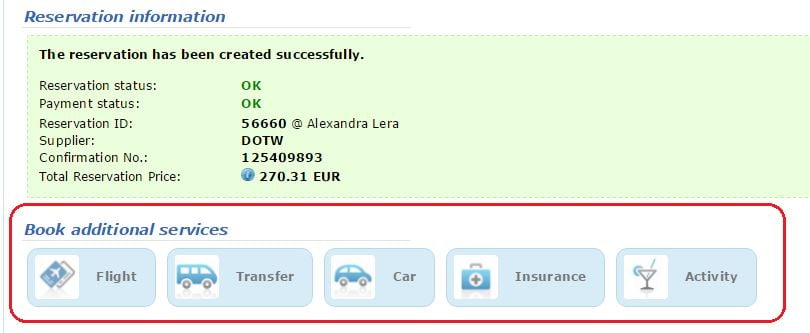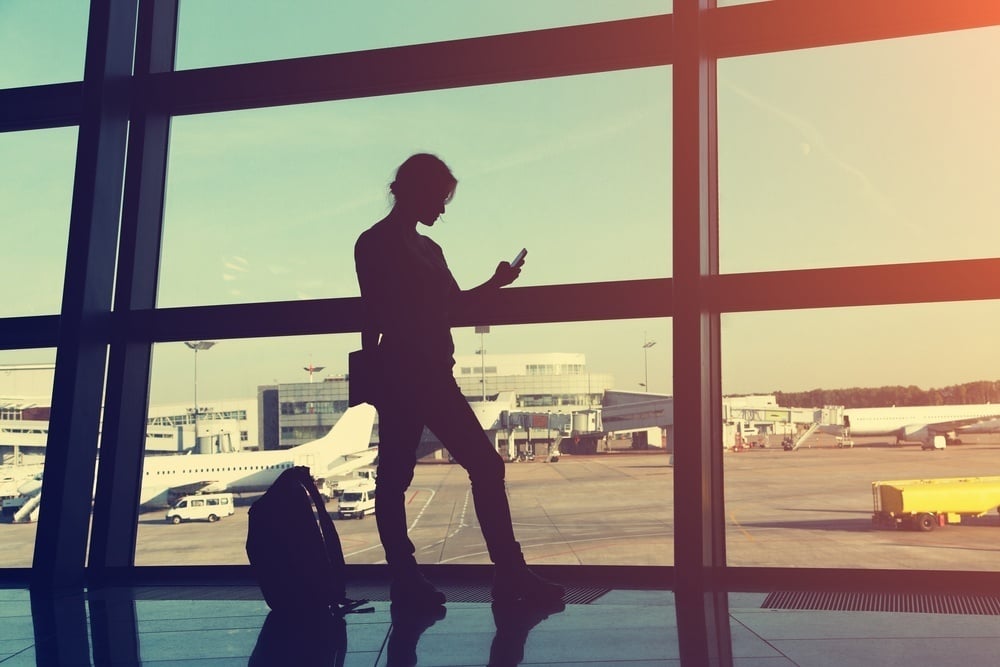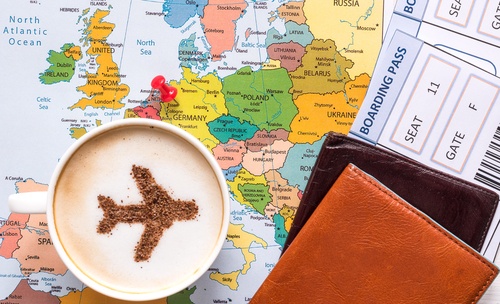travel tech insights
5 Stats That Paint A Bright Future for Travel Agents
By Nick Ostdick on Mar 28, 2017 2:00:48 PM

132,00. That’s how many travel agents were in operation in the United States in 1990, according to the U.S. Bureau of Labor Statistics (BLS). By 2014, that number had dwindled by half to about 71,000 and the projections for the next ten years indicate a continued decline by about 12 p …
Why Travel Companies Need An ERP Solution in 2017
By Nick Ostdick on Mar 22, 2017 6:32:57 PM

Today’s travel companies often find themselves in the same scenario as companies within a host of other industries: The prospect of having to do more with less. Because the 21st Century travel industry demands travel companies operate with greater agility, flexibility, and visibility, …
TBS Upsell & Cross-sell functionality in TBS - Travel Booking System
By dcs plus team on Mar 21, 2017 11:37:56 AM

The new option available is visible in the book page - after a reservation is created - and allows the user to the possibility to book complementary services It works very simple: let's assume a hotel reservation; once a booking is made, the system displays to the user the suggestion …
Product Updates - March 2017
By dcs plus team on Mar 21, 2017 11:36:36 AM
TBS travel booking system updates Resellers - flight searches and reservations counter A new section was developed in the 'Resellers' module - 'Search counter'. The section displays the total number of flight searches and reservations made by the reseller and offers the admin filter o …
5 Stats About the Current State of Corporate Travel
By Nick Ostdick on Mar 16, 2017 2:16:00 PM

If there’s one segment of the global travel industry that has continued to show potential for growth and development during the last five years, it’s corporate travel. As more countries emerge as hubs of international business and the global business community continues to align, the …
The Importance of Conversion Rates for OTAs
By Nick Ostdick on Mar 16, 2017 8:18:00 AM

Let’s examine a very common scenario in today’s travel industry: Your customer is browsing a travel package or destination on your site, has done their research, is fairly confident your site is offering the best value, but is still unsure about completing the booking. Their virtual s …
The Importance of Reporting for Travel Agents
By Nick Ostdick on Mar 14, 2017 3:47:26 PM

As with so many industries in today’s interconnected, global economy, data and analytics are core drivers in leveraging growth, productivity, efficiency, and profitability. A company’s ability to gather, interpret, analyze, and act on data sets is more than a value-added proposition i …
How A Travel ERP System Drives Travel Company Growth
By Nick Ostdick on Mar 9, 2017 8:05:00 AM

Speed. Accuracy. Scalability. These are the things on the minds of nearly every travel company in today’s global travel marketplace. Because the travel landscape is populated with so many major players, the prospect of administering back-office tasks and other repetitive, non-complex …
How Tour Operators Benefit From Mobile Technology
By Nick Ostdick on Mar 7, 2017 10:08:24 AM

Today’s travel industry is becoming increasingly mobile. Not only are more and more travel companies embracing the idea of mobile apps or platforms, but travelers are now more than ever before researching, booking, and reviewing travel and tourism options on-the-go. This movement has …
How Technology is Reshaping Corporate Travel
By Nick Ostdick on Mar 2, 2017 9:29:24 AM

One of the most disrupted segments in today’s travel industry is corporate or business travel. Because business moments and opportunities are no longer restricted to what happens in the office or boardroom on a 9 to 5 basis, corporate travelers are having to travel and engage in busin …
- travel technology (60)
- Travel Industry (49)
- travel agency (31)
- travel erp (31)
- travel trends (28)
- travel booking system (23)
- TINA (21)
- travel company (19)
- Tour Operator (18)
- Product updates (17)
- Travel Management Company (17)
- AIDA (15)
- TBS (15)
- Business Travel (14)
- dcs plus news (14)
- tour operator solution (14)
- travel website (14)
- travel erp system (13)
- Mobile App (12)
- Travel App (12)
- mid back office solution (12)
- trends (12)
- Corporate Travel (11)
- Industry Events (11)
- Mobile Technology (11)
- TMC (11)
- travel agents (11)
- erp (10)
- erp system (10)
- Tour Operators (9)
- Travel booking engines (9)
- dcs plus (9)
- online travel agency (9)
- travel agent (9)
- Mobile Bookings (8)
- travel (8)
- travel agencies (8)
- 2017 (7)
- Business Traveler (7)
- Mobile Travel (7)
- travel business (7)
- travel software (7)
- Digital Technology (6)
- Insider (6)
- Millennials (6)
- Online booking systems (6)
- Travel Management Companies (6)
- process automation (6)
- travel companies (6)
- Big Data (5)
- Partners interviews (5)
- Tour Operator Software (5)
- customer retention (5)
- travel agency technology (5)
- Booking engines (4)
- CSBT (4)
- Mobile Device (4)
- Mobile travel apps (4)
- OTAs (4)
- Static databases (4)
- Tour Companies (4)
- Travel Policy (4)
- Travel booking systems (4)
- Travel suppliers (4)
- back office automation (4)
- corporate self booking tool (4)
- millennial travelers (4)
- online travel (4)
- responsive travel website (4)
- technology (4)
- travel website conversion (4)
- 2016 (3)
- Content mapping (3)
- Databases (3)
- Demographics (3)
- Food and Adventure Tourism (3)
- Mobile Apps (3)
- Travel Distribution Channels (3)
- Travel Management Software (3)
- Travel customers (3)
- Travel history (3)
- anniversary (3)
- automated processes (3)
- content matching (3)
- global travel industry (3)
- social media (3)
- travel agency workflow (3)
- travel back office (3)
- travel marketing (3)
- travel process automation (3)
- AI in travel (2)
- Advanced Booking Systems (2)
- B2B Travel Resellers (2)
- Bleisure (2)
- Branding (2)
- Business Process Automation (2)
- Business Travelers (2)
- Customer engagement (2)
- Financial Reporting (2)
- Food Tourism (2)
- Inbound Marketing (2)
- Infographic (2)
- Leisure Travel (2)
- Saas (2)
- Templates (2)
- Travel Costs (2)
- Travel bookings (2)
- Travel start-up (2)
- Travel website abandonment (2)
- WTM 2016 (2)
- abandoned travel bookings (2)
- engagement marketing (2)
- internet booking engine (2)
- millennial traveler (2)
- new travel company (2)
- office (2)
- online reputation management (2)
- online travel reviews (2)
- reporting (2)
- software (2)
- start-up tips (2)
- travel agency management (2)
- travel agency website (2)
- travel experience (2)
- travel mobile app (2)
- travel packages (2)
- travel reservation system (2)
- travel system (2)
- travelers (2)
- web-based travel erp (2)
- 2020 (1)
- 360 Customer View (1)
- Advanced Accommodation Contract Management (1)
- Adventure travelers (1)
- Apps (1)
- B2B Reseller (1)
- B2B Resellers (1)
- B2C (1)
- BI Reporting (1)
- Budget traveler (1)
- Cancellations (1)
- Chat (1)
- Chinese millennial (1)
- Cloud (1)
- Cognitive computing (1)
- Comparison shopping (1)
- Conference (1)
- Contact matching (1)
- Content (1)
- Cruise (1)
- Culinary traveler (1)
- Customer relations (1)
- Digital Innovation (1)
- Digital Natives (1)
- Documents (1)
- Emerging market travelers (1)
- Emerging markets (1)
- Errors (1)
- Experimental travel (1)
- Financial Dashboard (1)
- Import rates (1)
- Instant messaging (1)
- Integrate with Accounting Software (1)
- Internet (1)
- Luxury traveler (1)
- Mobile Transaction (1)
- Mobile payments (1)
- NDC distribution (1)
- Operational Reporting (1)
- Reseller networks (1)
- Resellers (1)
- Response (1)
- Subagents Network (1)
- TINA Academy (1)
- TTE (1)
- Travel Reseller Network (1)
- Travel Revenue Management (1)
- Travel booking problems (1)
- Travel finance reporting (1)
- Travel stats (1)
- WTM (1)
- abandonment (1)
- accomodations (1)
- advanced reporting (1)
- airline direct connect technology (1)
- ancillary services (1)
- cloud computing (1)
- collection (1)
- collection challenges (1)
- common data model (1)
- conversion rates (1)
- corporate mobile app (1)
- cost control (1)
- credo ventures capital invests in dcs plus (1)
- customer reviews (1)
- data analysis (1)
- dcs plus credo investment (1)
- dcs plus credo ventures (1)
- deloitte technology fast 500 EMEA (1)
- digital transformation (1)
- e-invoicing KSA (1)
- email marketing (1)
- email marketing for OTAs (1)
- erp e-invoicing (1)
- lost travel bookings (1)
- modern travel agencies (1)
- networks (1)
- new features (1)
- offers (1)
- online customer review (1)
- online reputation (1)
- online travel agencies (1)
- risk management (1)
- sales (1)
- senior travelers (1)
- shopping baskets (1)
- shopping carts (1)
- social network (1)
- standardized processes (1)
- static content (1)
- travel SaaS (1)
- travel account services (1)
- travel agency customers (1)
- travel agency profitability (1)
- travel analytics (1)
- travel blog (1)
- travel planning (1)
- travel reviews (1)
- travel shopping carts (1)
- travel software for agencies (1)
- travel software system (1)
- travel technology europe (1)
- travlist smart mobile app (1)
- trend (1)
- trusted adviser (1)
- trusted advisor (1)
- upsell functionality (1)
- vouchers (1)
- website traffic (1)
- zatca (1)